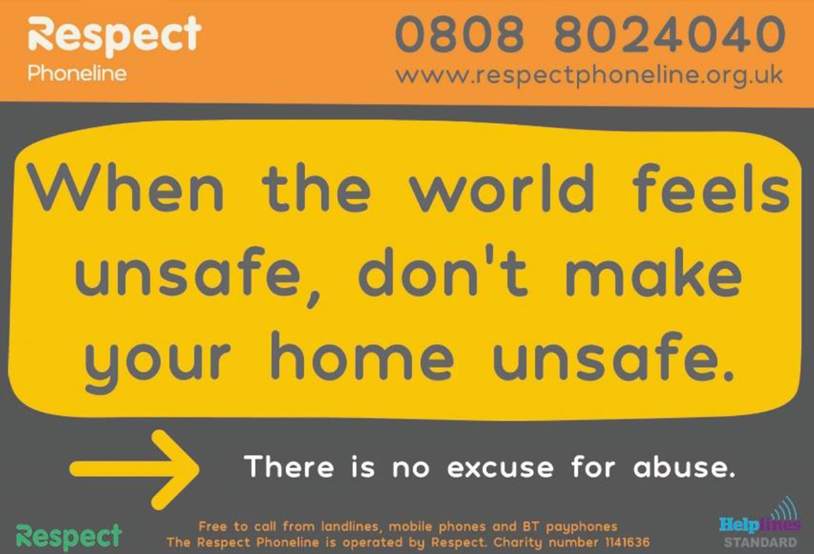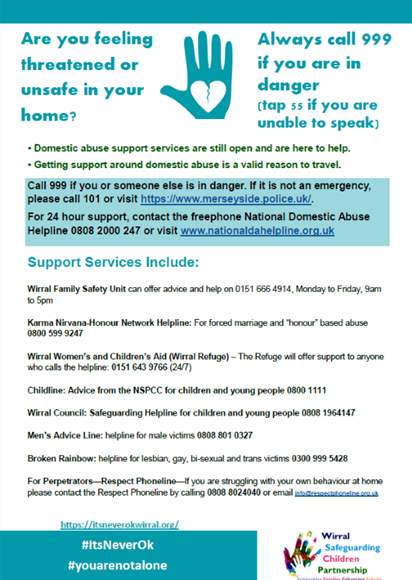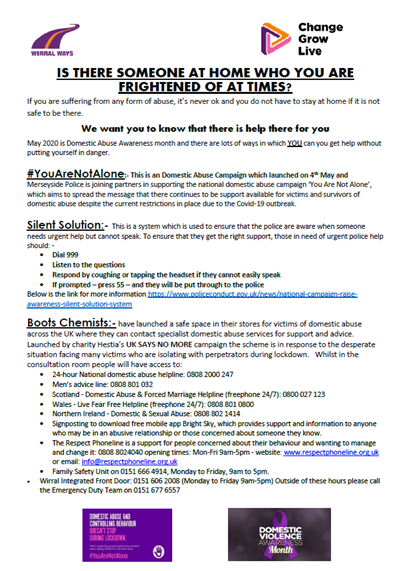Domestic Abuse Support during Covid-19
Domestic Abuse includes any incident or pattern of incidents of controlling, coercive or threatening behaviour, violence or abuse between those aged 16 or over who are or have been intimate partners or family members regardless of gender or sexuality. This can encompass but is not limited to the following types of abuse:
- Psychological;
- Physical;
- Sexual;
- Financial;
- Emotional.
Controlling behaviour is: a range of acts designed to make a person subordinate and/or dependent by isolating them from sources of support, exploiting their resources and capacities for personal gain, depriving them of the means needed for independence, resistance and escape and regulating their everyday behaviour.
Coercive behaviour is: an act or a pattern of acts of assault, threats, humiliation and intimidation or other abuse that is used to harm, punish, or frighten their victim.
This definition, which is not a legal definition, includes so called ‘Honour’ Based Violence, Female Genital Mutilation (FGM) and Forced Marriage, and is clear that victims are not confined to one gender or ethnic group.
Domestic Abuse and Covid-19: Advice and Support
Public services and support agencies in Wirral have a message to anyone experiencing domestic abuse during the COVID-19 (Coronavirus) pandemic: You are not alone, and we are still here to support you.
While residents will be following Government advice and staying home to help reduce the risk of COVID-19, we know that there are vulnerable people in our communities who will be concerned about the prospect of staying home – particularly those who are dealing with domestic abuse, violence, and coercive or controlling behaviour.
Wirral Council and partners continue to work with Merseyside Police and providers of domestic abuse support to maintain essential services for anyone affected during the weeks and months ahead.
Tom Usher, Cabinet Member for Children and Families, said:
“While staying home is the safest thing to do to help reduce the spread of COVID-19, we know that home isn’t always a safe place.
“The council – and public services generally – are adapting to new ways of working at the moment, but this doesn’t mean anyone suffering abuse is alone. We are still here to help – so please, if you are struggling or in danger, please don’t suffer alone. Text or call us and we will be there for you.”
Advice and information is available by telephone, text message or online services. Sources of support are listed below, and you can find examples of coercive or controlling behaviour at the Women’s Aid website.
Help for those Concerned about their own Behaviour
Respect Phoneline Covid-19 Campaign
Many families and relationships will feel increased pressure and for those living with domestic abuse, this could cause serious harm.
The Respect Phoneline is a key source of support for people concerned about their behaviour and wanting to manage and change it. Now more than ever, the Respect Phoneline will be critical to family members and others who are finding it difficult to manage their behaviour during this difficult time. We need them to know that support is out there and that there is no excuse for abuse.
If you are struggling with your own behaviour at home pleas contact the Respect Phoneline using the contact information below:
• website: www.respectphoneline.org.uk
• call: 0808 8024040
• opening times: Mon-Fri 9am-5pm
• webchat: Thurs & Fri 10am-11am & 3pm-4pm
• email: [email protected]
Who to contact
If you, your child or anyone in the family are at immediate risk of harm, you should contact the police urgently, CALL 999. If you are a Wirral resident and are experiencing domestic abuse or believe someone you know is, please contact Wirral Integrated Front Door: 0151 606 2008 (Monday to Friday 9am-5pm). Outside of these hours please call the Emergency Duty Team on 0151 677 6557.
Further support
Poster with local and national support numbers.
Poster from Wirral Ways:
Economic-abuse-and-the-coronavirus-outbreak-1
Wirral Family Safety Unit: Independent Domestic Violence Advisors will continue to offer telephone support to victims of domestic abuse, and to all victims where risk of ‘harmful practices’ needs to be explored (forced marriage, honour-based abuse and female genital mutilation (FGM). Call an advisor on 0151 666 4914.
Tomorrow’s Women Wirral: The team is in regular contact with women during this difficult time. Please call 0151 647 7907 if you need help, and one of the team will offer advice and a listening ear.
Savera UK have published helpful information for individuals who are at risk of or victims of Domestic Abuse. It can be accessed by clicking here.
Wirral Women and Children’s Aid: Provides a 24/7 helpline. Please call 0151 643 9366 for guidance and support. Women’s Aid: https://www.womensaid.org.uk/information-support/
National Domestic Violence Helpline: 0808 2000 247 (24 hours).
Worst Kept Secret Helpline: 0800 028 3398.
Refuge: (includes information for men) | refuge.org.uk | 0808 200 0247 (24 hours) The Men’s Advice Line, for male domestic abuse survivors: 0808 801 0327.
National LGBT+ Domestic Abuse Helpline: 0800 999 5428.
Samaritans (24/7 service): 116 123.
DOMESTIC ABUSE NATIONAL HELPLINES
Domestic Abuse and Children
The issue of children living with Domestic Violence and Abuse is now recognised as a matter for concern in its own right by both government and key children’s services agencies. The link between child Physical Abuse and Domestic Violence is high, with estimates ranging between 30% to 66%.
In 2002, nearly three quarters of children subject of a Child Protection Plan lived in households where Domestic Violence and Abuse occurs
Children living in a family environment where there is Domestic Violence and Abuse are at risk whether or not they have directly witnessed the abuse. Some children living with Domestic Violence and Abuse are at risk of Significant Harm.




